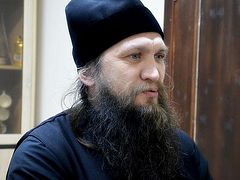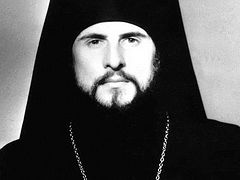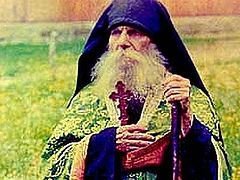 Photo from the archives of Abbot Clement (Krivonosov)
Photo from the archives of Abbot Clement (Krivonosov)
Igumen Clement (Krivonosov), the abbot of St. Seraphim’s Monastery on Russky island in the Sea of Japan, shares with us his thoughts on neophytes with a quarter of a century of experience, the border between individuality and selfhood, modern monks and Patericons, and many other interesting and important things.
 The brethren of the monastery with Abbot Clement
The brethren of the monastery with Abbot Clement
God’s providence acts with spiritual tact
We constantly live in the flow of God’s providence, in everything. Occurrences and events are always happening that don’t fit into the usual laws of nature. And these cases can be classified as miracles of God, special manifestations of God’s providence for us.
We take the bees out to the apiary—the car breaks down, we look for another—help immediately comes. Then there’s the weather and other things… The brothers get sick, money is scarce—and again, miraculous help. Everything is somehow arranged providentially—we live in this mode all the time.
For a believer, the providence of God is obvious in everything, and if it’s not obvious, it’s still visible. But for a non-believer—even if you tell him about a clear miracle, you lay it out on a platter—he’ll say: “So what?!” He remains insensitive to the miracle.
The providence of God always acts with spiritual tact—the Lord comes into our life very tactfully, with peace and love.
Not on the tongue, but in the heart
It is important for each of us to meet a true Christian on our path in life. Whether a priest or layman, what matters is that he’s a living bearer of spiritual values, for whom these values are not on the tongue, but in the heart. For me it was a priest—Archpriest Leonty Kolnogorov. He serves in the Edinovertsi Church of St. Nicholas the Wonderworker in Nizhny Tagil.
The Edinovertsi are Old Believers who are in prayerful and Eucharistic communion with us. I didn’t know such subtleties then, it just so happened that I first had a heart-to-heart talk with this batiushka when I was still unbaptized. I was so affected by talking with him that I asked him to baptize me. And he has remained a living example of a Christian for me for the rest of my life. This was my first, most important encounter.
The Lord later sent me more mentors. There was Metropolitan Benjamin (Pushkar) of Vladivostok and Primorye, who was our ruling hierarch for almost a quarter of a century. You could say he created the clergy of the diocese. With rare exceptions, all of our monks and priests today were tonsured and ordained by him.
Is spiritual mentorship possible in our days?
It’s often said now that there are no more true spiritual guides in our days, there can be no guidance, you just have to live with spiritual advice.
I believe that spiritual mentoring is possible in our days too; it’s just that this relationship requires a certain spiritual, cultural, intellectual, and even simply psychological level from the spiritual child and from the mentor himself.
Neophytes with a quarter of a century of experience
In the 1990s, many new people came to the Church, including our brethren. There is practically no one in our monastery who was raised Orthodox from childhood. I grew up in an unbelieving family and wasn’t baptized until I was twenty-four. So we are, generally speaking, neophytes, though with fifteen years of experience, or twenty or twenty-five.
During this period, we experienced a variety of temptations and mistakes, including in spiritual leadership. We learned from these mistakes. Thus the Lord worked providentially on the scale of our entire Local Church, because there was a similar situation in all of our monasteries.
Exceptions are exceptions. Sporadic monasteries remained where the spiritual succession was preserved. This period was very difficult for all of us, but we survived it with God’s help. Even the Lavra elders who nourished us spiritually also made mistakes in guiding other people. Now we’re entering a different period—we already have some experience. It’s good to learn from your own experience—from practice, not just theory.
We could write our own Patericons
We have these books called Patericons. They describe the mistakes, falls, and temptations of the fathers who lived the monastic life. We could write our own Patericons, because we experienced all of this. We haven’t just read about it in books, but experienced it for ourselves: prelest,[1] madness, pride, and inexperienced “elders.” Temptations from the right are when a monk is drawn to pride, vanity, and prelest, and temptations from the left are when he is a drawn into fornication, gluttony, lust, love for the world—towards the flesh. We have experienced and still experience all this. We learn from this.
I’m only now starting to understand what spiritual guidance is
I’ve had to learn what spiritual guidance is. I’ve been the abbot of the monastery for ten years and I’m only now beginning to understand what spiritual guidance is. It’s like in family life. I even think the situation in a monastery is better than in a family. There is no one to teach family life. People get married and they’re completely unprepared for it, and they don’t have any examples of normal family life, because their parents also didn’t have any proper worthy examples.
Everything has to be learned. After all, the relationship between spouses should be very subtle, tender. You need both worldly and spiritual tact and discernment; you have to respect the personality of your loved one, not crossing any boundaries that ought not be crossed.
It’s the same in monasticism. We read in the Patericons that you need obedience—so you go and drop the hammer, and people are outraged and grumbling. But you don’t have spiritual discernment, and you don’t know how to drop the hammer correctly.
Or, I decided: The elders were kind, and I will try to become a good abbot; I will love everyone and forgive everyone everything. This also leads to distortions, only on the other side—the brothers stop perceiving you as their elder, they walk all over you, and passions grow in them like wild flowers.
A spiritual leader must sometimes also be a spiritual whip. You need to learn all this from your own experience. Where is the border between hardness and softness? Between condescension and mercy and strictness and exactingness?
Where is the border between individuality and egotism?
We have to clearly understand where the border between individuality and egotism runs. This is that which a spiritual father shouldn’t touch, where he shouldn’t intrude. It is the image of God in man, given him by the Creator. And if a spiritual guide begins to harshly intrude, then most often there will be a conflict with the spiritual child.
On the other hand, a spiritual father is a spiritual doctor. He should help his spiritual child renounce his passionate nature, his egotism, so he can grow spiritually and bear fruit. The ego must be broken, but individuality—never. Go figure… After all, man is not a Kalashnikov [machine gun], but a living being. It’s hard to get good results even with a plant—how much to water it, what kind of fertilizer to use; but man is much more difficult, and therefore that spiritual guidance is a whole science.
How to be happy in a family or a monastery?
The familial and monastic paths both require a man to display the same spiritual virtues; both require a struggle with the passions. Otherwise, a man will not be happy either in a family or in monasticism.
It depends on the spouses whether a family will have Paradise or hell, warmth or cold. It’s the same in a monastery—it will become either happiness or a prison for a monk. Of course, the personality of the abbot is important, but still, much depends on the monk himself.
The passions in a family and in a monastery are the same. To be happy even in the earthly plane, if we’re speaking about earthly peace, we mustn’t repay evil with evil, but love others, bear one another’s infirmities, as the Apostle Paul says: Bear ye one another's burdens, and so fulfil the law of Christ (Gal. 6:2). We have to be merciful and patient.
Why are people unhappy in families? Because they can’t get over their selfishness. It’s the same in a monastery. You have to renounce your old man, renounce the ego. Don’t take revenge, don’t contradict.
Let’s say there’s a family conflict. The wife says one word to the husband, he says five in return, she says ten, and the conflict develops. Whoever stops first is a martyr: He allows the anger to stop on himself. From a worldly point of view, he lost, but from the spiritual point of view, he conquered his egotism, he overcame this argument.
The same thing happens in monasticism. You can argue with the brethren about anything, but it’s more correct to cut off your own will and peacefully fulfill your obediences.
You have to understand that you can’t remake someone else. This is how he is. You can’t change yourself in any way, and so how are you going to remake someone else, or even prove something to him by raising your voice?! The Lord spoke about this: Thou hypocrite, first cast out the beam out of thine own eye; and then shalt thou see clearly to cast out the mote out of thy brother's eye (Mt. 7:5).
Every monastery is a spiritual family
Personality is unique. If a spiritual father starts breaking a person under himself, starts stepping all over his personality, this is incorrect. “I told you to do this!” You have to separate the person from the ego. There must be spiritual discernment; you have to be able to see where a person bends, and where he breaks.
Age is important here. A young branch can bend, but you can’t bend an old one anymore. The young can and must bend, but they also have to know their own measure. Let’s say Fr. Agafangel came at seventy years of age, was tonsured at seventy-two, and now he’s already ninety, and I’m forty-five. How am I going to remake him?! He has lived his life—he is how he is.
Every monastery is a spiritual family. Even in families that aren’t the best, the parents love their children. Thus, in a monastery, the abbot should be like the parents in a family: He should love his children and condescend to their infirmities, and at the same time, educate them. Because the Lord will ask him: Why did you allow them to become so undisciplined?! I gave you authority! Just like a parent’s authority over his children.
Which path is more difficult: family or monastic?
For me personally, the family path would be more difficult than the monastic path. I know how difficult it is for a person to live a Christian life in the world—to keep your own fasts, to find work to make an honest living, and to maintain a family with dignity at the same time. It’s easier for us to live a Christian life in the monastery. We’re in a quiet harbor here, but in the world they live as in a raging sea.
In the world, the family’s task is to become a kind of fortress where a unified spiritual atmosphere is preserved, and parents need to preserve spiritual closeness with their children, not lose them, especially during adolescence; and this is very difficult. The world with its sinful allurements can be attractive, and it’s very difficult to retain children in true values, in faith, and to raise them as Christians.
I don’t know what this is like in practice—I grew up in an unbelieving family. My grandmother was a believer, it’s true, but my grandfather was a communist, and grandma hid her faith. Although, I saw her icons, I saw her praying, but she didn’t reveal her faith to us and didn’t try to pass it on.
It’s simpler in a monastery: We receive people who are already determined. If someone doesn’t agree to live by our internal rules, we say: “Well, then live how you want, just do it outside our territory.” But in a family, parents won’t say this to their own child. They have to endure, even if they have become spiritual strangers to one another. It’s a real drama.
This almost never happens in monasticism. In a normal monastery, as a rule, the spiritual family is in unity, and everyone understands why they’re there.
In honor of St. Seraphim
Our Russky Island is located at the very edge of the Earth, in Peter the Great Bay in the Sea of Japan. Before the revolution, the 34th East Siberian Infantry Regiment served here, guarding the eastern borders of the Russian Empire. And there is still an army on the island, only now it’s spiritual—the brethren of our monastery.
Our monastery is named in honor of St. Seraphim of Sarov, since the main church was built and consecrated in his honor back in 1914. At that time, it was a regimental church. After the Russo-Japanese War, the regiment was permanently stationed on the island, and the soldiers built barracks here, and for their camp church they erected a sturdy building—our church.
Then the First World War began, the riflemen were sent to the front; the church was transferred to the local diocesan jurisdiction, and in the 1920s it was turned into a club. Later they even forgot that the church was once in honor of St. Seraphim…
When a parish was opened here in the 1990s, it was only thanks to local historians that they remembered the saint in whose honor our church was consecrated. In 2001, the monastery was opened.
We have parishioners who come here from the city and are spiritually nourished in our monastery.
About saints in our lives
Of course, we greatly venerate St. Seraphim of Sarov, since it’s his monastery. We venerate St. Matrona [of Moscow], and Blessed Xenia [of Petersburg]. Special relationships are developed with every saint. It’s hard to explain, since we don’t know them personally, but you read their lives, you pray—and when you pray, you feel closeness to the saints, sometimes even their different characters and personality traits. After all, every person is unique, each manifesting the image of God in his own way. It’s the same with the saints—each reveals facets of sanctity in a special way.
I could name the top ten, so to speak, saints whom our brotherhood venerates. It’d be better to say to whom we most often turn for prayerful help: Blessed Matrona and Xenia, the Royal Passion-bearers, St. Nicholas the Wonderworker, the Optina elders, St. John the Forerunner. We also venerate Sts. Nicholas of Japan, Innocent of Irkutsk, and John of Shanghai—saints who are near to us geographically.
The life of our monastery
The monastery is in a new place, and we first took the typikon of the Holy Trinity-St. Sergius Lavra as our foundation, as the Lavra elders blessed us. Then life brought some changes, and we added something, changed something, of course within the bounds of the typikon, whether becoming stricter or, on the contrary, more lenient.
The typikon changes sometimes, depending on the spiritual maturity of the brotherhood. It’s one thing if the monastery is very young, and another if the brotherhood is already firmly on its own feet. Since 2013, we’ve been serving Matins in the morning. It’s usually served in the evening in parishes, and it turns out the daily cycle of services is broken; and this happens everywhere.
In monasteries, you can organize the daily cycle correctly, so the Midnight Office is served in the first hours after midnight, Matins is served in the morning, at sunrise, and in the evening—Vespers and Compline. We moved over to this routine. We get up at 3:30 AM and Midnight Office begins at 4:00. This is roughly how Mt. Athos serves, so it’s been sanctified by the monastic tradition. Liturgy is at 6:00 on weekdays, and later on the weekends—it’s oriented towards parishioners, so they have time to get here.
On gobies, bees, and seafood
When the monastery had just opened, the brothers were involved in fishing, roasting gobies,[2] then eating them in cutlets. But we don’t do our own fishing anymore: It requires a boat that has to be properly maintained and stored somewhere, and you need a permanent person dedicated to this.
Sometimes people ask about seafood during the fasts. What can I say? We’re not Greeks; we don’t eat seafood during the fasts: They’re living organisms, not plants.
But we have a rather large apiary with forty hives, and an experienced beekeeper, Monk Pitirim. He’s seventy-five but still strong. The island is often foggy and very humid, so we take the hives every year to the taiga to harvest the honey, with two or three brothers living in the taiga[3] during this time.
We also have a farm: six dairy cows, calves, chickens. We have a bakery. We bake bread and pastries, including for sale. These are our trades by which we support the monastery.
But we don’t catch fish. It’s actually not so easy. You have to have official documents, permission, approval, and it didn’t work out for us for some reason.
There are picturesque places around the monastery, there are trails, and in previous years I would often go for a walk around the island. I would go out into the woods, but now I hardly go out. Maybe I’m just not as young as I used to be.
In closing, I wish all the readers of OrthoChristian.com God’s help. Come visit us!












